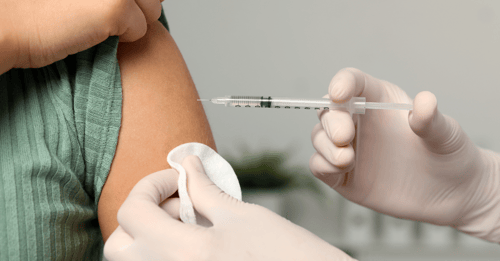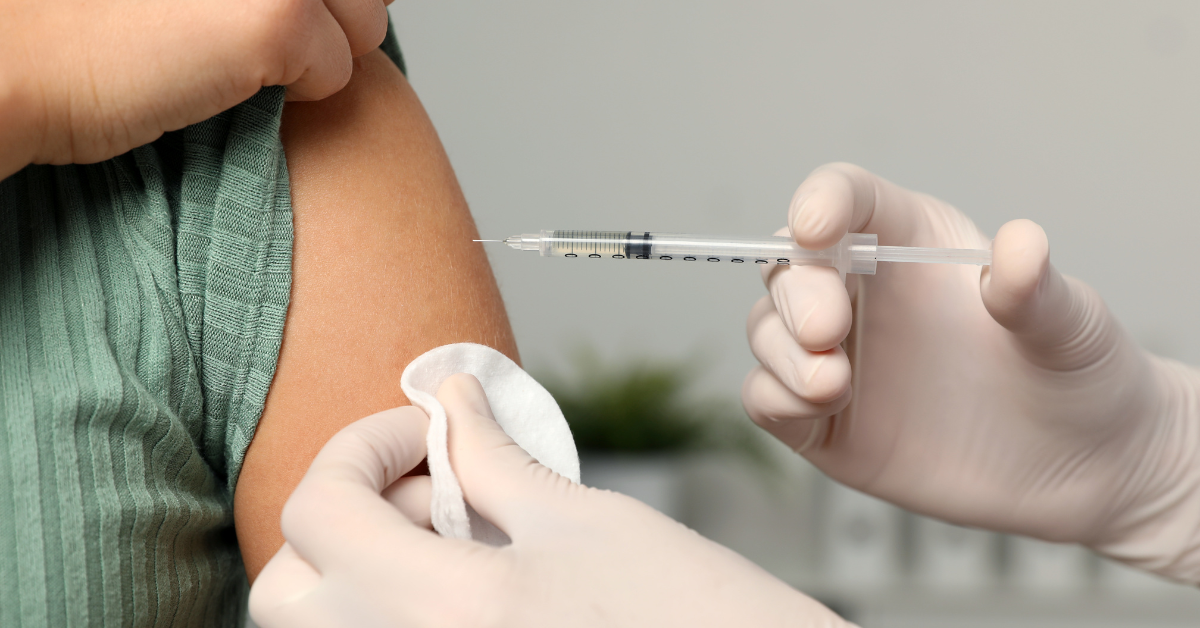Did you know there is a vaccine that can protect you from certain types of cancer? HPV, short for Human Papillomavirus, is one of the most prevalent infections worldwide, as common as the flu. Core Clinic Resident Dr. Sivahami, Obstetrician & Gynaecologist from Astra Women’s Specialists, shares everything you need to know about the HPV vaccine, including its benefits, safety, and effectiveness.
In Southeast Asia alone, nearly 3% of women are affected by this virus (HPV Information Centre).
Transmitted through skin-to-skin contact, HPV is highly widespread, particularly among individuals who have ever been sexually active. The virus comes in many different types or strains, which are broadly categorised into two groups: “low-risk HPV” and “high-risk HPV.
- Low-Risk HPV: May cause genital warts but is not cancer-forming.
- High-Risk HPV: Can infect the cervix and lead to pre-cancerous changes, potentially causing cervical cancer
Although there is no treatment or cure for HPV infections, the good news is that they can be prevented through vaccination. We strongly encourage everyone—ladies and gentlemen alike—to safeguard their health by getting the HPV vaccine. After all, vaccination is your first line of defence against cervical cancer. In this article, we’ll also address some of the most commonly asked questions about the HPV vaccine to help you make an informed decision.

This vaccine is designed to protect you against future exposure to some of the most common cancer-causing HPV strains.
1. What is the HPV Vaccine?
The HPV vaccine is made from virus-like particles (VLPs) that contain no HPV DNA, meaning it helps your body build immunity without causing an infection. This vaccine is designed to protect you against future exposure to some of the most common cancer-causing HPV strains. There are three types of HPV vaccines available:
- Cervarix
- Gardasil
- Gardasil 9
Each of these vaccines targets specific HPV strains linked to cervical and other cancers. Your healthcare provider can help you decide which option is best for you. It’s important to note that the HPV vaccine does not treat any existing HPV infections. Instead, it is specifically designed and approved to protect you from future HPV-related conditions, including cervical cancer and pre-cancer. By getting vaccinated, you’re taking a proactive step toward reducing your risk—one less cancer to worry about!
2. How Effective is the HPV Vaccine?
The HPV vaccine provides more than 90% protection against cervical cancer and targets up to seven cancer-causing HPV strains. Depending on the vaccine type, it can protect against 70%–90% of cervical cancers worldwide. Completing the full recommended vaccination schedule is essential to ensure the best possible protection. However, even after getting vaccinated, regular cervical cancer screenings are vital for early detection and maintaining health.
3. Is the HPV Vaccine Safe?
Absolutely. The HPV vaccine has a well-established safety record and is endorsed by the World Health Organization (WHO) and other leading health authorities worldwide. The most common side effects are mild and include pain, swelling, or redness at the injection site, as well as temporary headaches.
4. Who is the HPV Vaccine Suitable For?
.png?width=500&height=262&name=blog_Why%20Do%20You%20Need%20HPV%20Vaccine%20and%20How%20It%20Can%20Prevent%20Cancer%20and%20More%20(2).png)
The ideal time to get vaccinated is before any exposure to HPV, which is why it’s often recommended for younger individuals
The HPV vaccine is recommended for both boys and girls:
- Ages 9–14: Two doses (administered at 0 and 6 months).
- Ages 15 and above: Three doses (administered at 0, 1–2, and 6 months).
The ideal time to get vaccinated is before any exposure to HPV, which is why it’s often recommended for younger individuals. However, even those who may have already been exposed can still benefit from the vaccine. It’s best to consult your gynaecologist for personalised guidance.
For optimal protection against cervical cancer, combining HPV vaccination with regular cervical screenings is key. Beyond cervical cancer, the HPV vaccine also helps lower the risk of other HPV-related cancers. Remember, HPV is preventable! If you haven’t had your HPV vaccine yet, there’s still time to protect yourself. You can get vaccinated at our clinic, Astra Women’s Specialists at Core Collective i12 Katong. Take the first step toward protecting your health today!
Featured Contributor:

Astra Women's Specialists
Dr Sivahami
Obstetrician & Gynaecologist
Astra Women's Specialists is the Women’s Health arm of Singapore Medical Group (SMG), with a network of Obstetrics & Gynaecology clinics and a Breast Care Centre, helmed by specialists dedicated to women’s health and wellness. They believe that specialist care should be easily accessible, with their clinics ideally located in the heartlands. Their range of services includes:
- Pregnancy
- Gynaecology
- Fertility
- Birth Control
- Laparoscopic Surgery
They are dedicated to seeing you through your health and wellness journey at every stage of life by providing accurate content you can trust and connecting you to a comprehensive range of women’s health services.
Connect with Astra Women's Specialists on their Website, Instagram, and Facebook.
Core Collective is home to over 100 fitness, wellness, beauty and lifestyle and medical professionals who can help you live your best life. Book a tour to get started today!
.png)


.png?width=500&height=262&name=blog_Why%20Do%20You%20Need%20HPV%20Vaccine%20and%20How%20It%20Can%20Prevent%20Cancer%20and%20More%20(2).png)